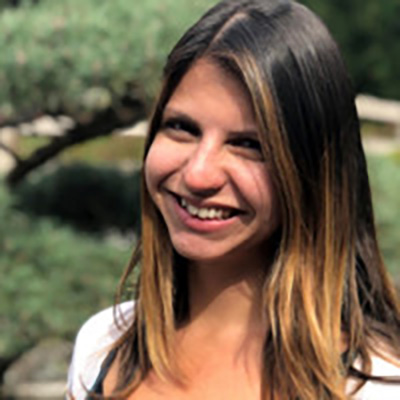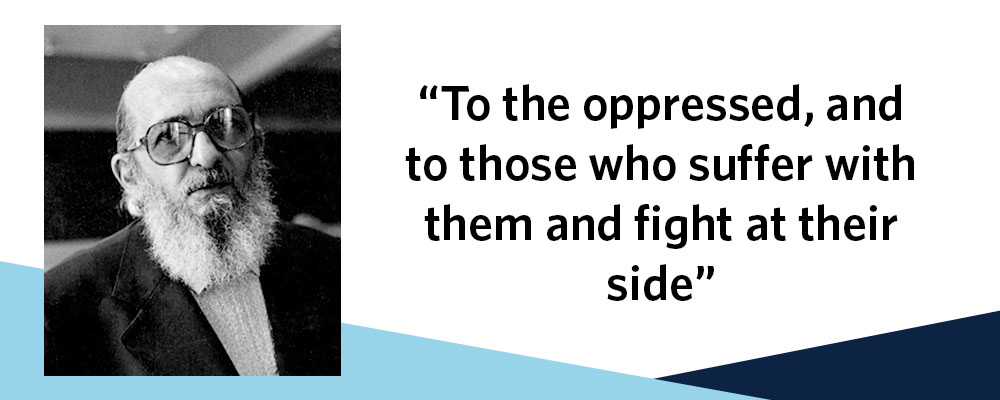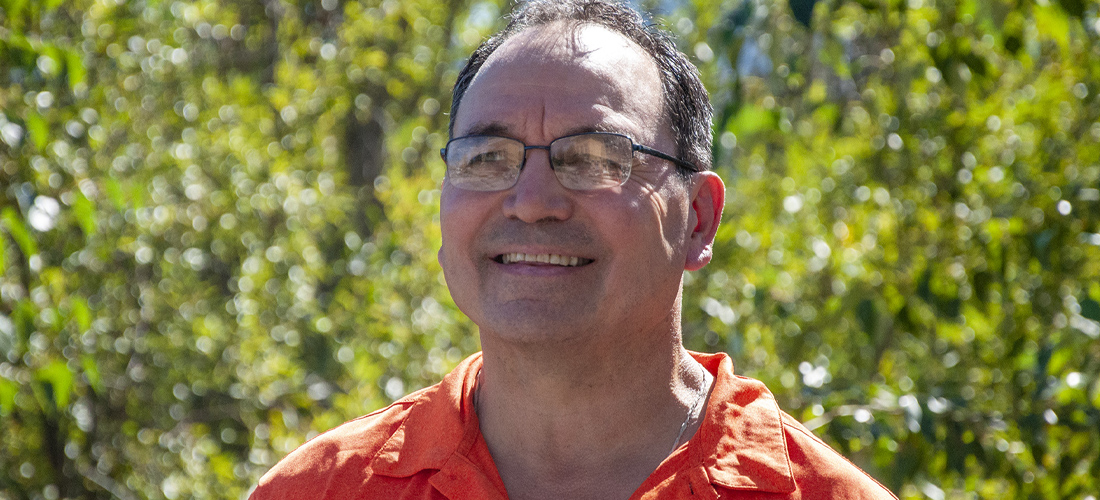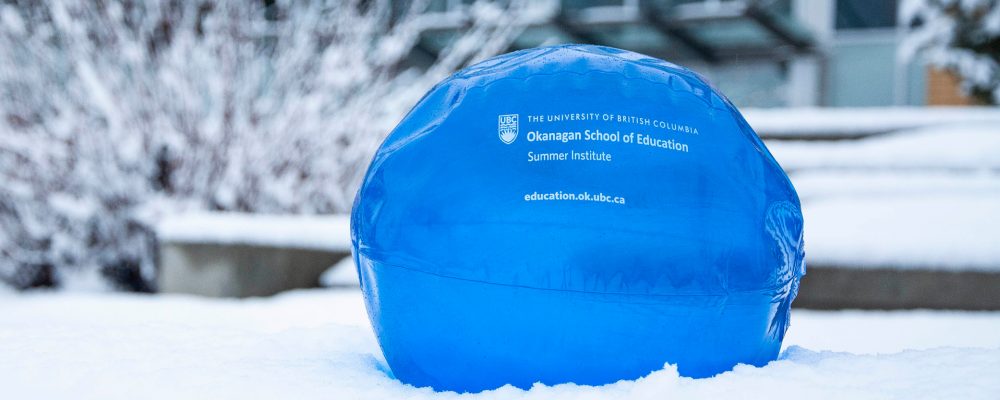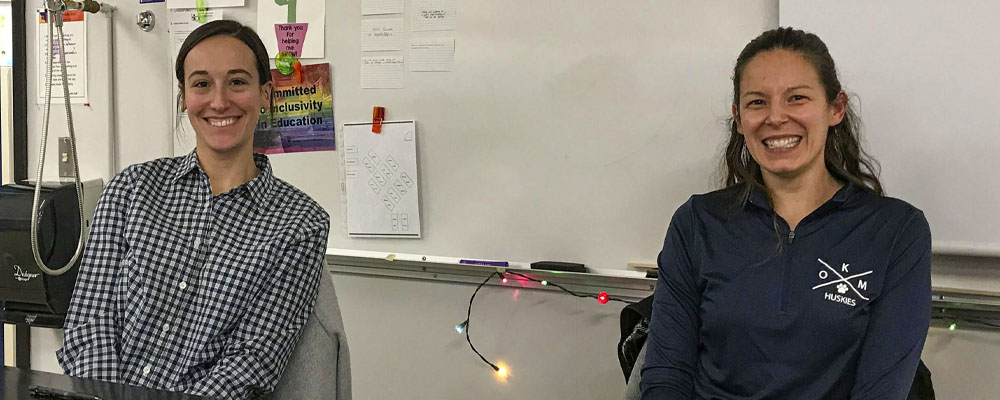
Lindsay Ellis (left) and Candace Sharko (right)
The relationship between a teacher intern and their mentor can be an exceptionally transformative learning experience. Mentors play a vital role in our teacher education program as they help to guide interns’ learning and influence their identity as future teachers. Interns can bring new energy, ideas and practices to a classroom.
At Okanagan Mission Secondary School (OKM), Lindsay Ellis, intern, and Candace Sharko, mentor, have a great working relationship – that perhaps stems from some common traits, professional goals, and shared beliefs in promoting equity and inclusion in the classroom.
After Ellis earned her Bachelor and Masters in Exercise Physiology, she left academia to become a nanny for three wonderful children.
“I was coming home really excited and happy, even though I was exhausted, and I realized that this was probably the most worthwhile work I’d ever done – helping to raise these three kids – and I thought maybe I should listen to everyone who had said I should be a teacher,” says Ellis with a laugh. “I’ve always wanted to be a teacher or be teaching in some way. I think that some of the most powerful relationships I’ve had have been with teachers or people who have taught me things.”
For Sharko, the path to becoming a teacher was also centered around helping.
“I always knew I wanted to work with people and to help in some capacity. I was deciding between nursing and teaching while pursuing my sciences degree, and I found I was thinking of some of the teachers I had, like my calculus teacher, who helped me almost every morning. I realized how much easier it was for me in university because that teacher had helped me through that class,” says Sharko as she reflects on her career inspiration. “And I like working with kids.”
Prior to the start of the school year, the pair meet over Zoom to talk about rules, responsibilities, expectations and roles in the classroom as they prepared to teach Life Sciences 11 and Fitness.
“We talked about what my role would be during unit one, two and three so we knew what the plan was when I started,” says Ellis. “I liked that there were no surprises in that aspect and it allowed me time to think, soak things in and test out some things before going full throttle with teaching.”
Ellis and Sharko followed a gradual release model; meaning Sharko taught unit one and Ellis helped when needed, unit two followed a co-teaching model (50/50) and unit three is when Ellis took the lead.
Their energy is practically electric as they divulge into the lessons they planned together, the classes they taught and their establishment of their reciprocal relationship.
“We know that there are so many different learning styles in our class, so we try to make sure that we’re connecting with all the students and giving them variety too,” says Sharko, describing lesson design. “I really appreciate working with Lindsay because there are all these ideas floating around, and we’re building on them and coming up with something that works in the classroom. I’ll have an idea for a unit and then Lindsay will add a theme to it, and it’ll be a direction I wouldn’t have thought of.”
One example of a new direction took place during Life Sciences 11. Inspired by the First Nations Education Steering Committee (FNESC) Science textbook, introduced by Okanagan School of Education lecturer Desiree Marshall-Peer, and a connection to Kevin Kaiser, Resource Teacher/Consultant for School District 23 through Melissa Madden, OKM Indigenous Advocate, Ellis created a unit on marine invertebrates; the role of community in Ellis’ teaching philosophy becoming ever evident.
“I worked really hard to find natural connections so that the teachings were seamless and authentic. Typically in Science, when we were talk about the classification of organisms we’re used to using taxonomy or phylogenetic trees,” says Ellis. “But Indigenous peoples look at classification in terms of life, connectedness and reciprocal relationships. For example, some organisms may be used for food, and others may have a role in clothing and shelter.”
Kaiser came into her Life Sciences 11 class to talk about the classification of life and how it is viewed through the Indigenous lens. Speaking enthusiastically and warmly of his visit, Ellis and Sharko reminisce about how great it was to incorporate an authentic voice in the classroom.
In addition to her Life Sciences 11 class, Ellis was teaching Fitness.
“Candace has crafted this really wonderful fitness class wherein she encourages students to take ownership of their mental and physical well-being,” says Ellis. “When I invited Kaiser back to our Physical Fitness class, I felt it linked really well to what Candace had already set the stage for, and encouraged students to think about their health through a holistic lens.”
Kaiser talked about the community-based approach to mindfulness and well-being in Indigenous culture – using the example of making dip nets for fishing out of milkweed. He then taught the class how they make the nets.
“It was an informal, super powerful teaching moment,” says Ellis with a smile.
The students stood in a circle and worked on making their rope, while having conversations about the traditional roles, like how one person would harvest the milkweed, or how some may tear it or twist it. They talked about while some people like a certain role of this process, they may not be fond of another; the focus of this lesson was trying something new, and giving the students another opportunity to see that mindfulness looks different for everyone.
Ellis’s desire for trying new things and her passion for connecting Indigenous knowledge and practice is very much rooted in her teaching identity.
“The most important pieces of my teaching are the promotion of equity and inclusion,” says Ellis. “I find it really important for all students to see themselves reflected in their learning.”
While this internship may not have been the one she expected to have when she started her Bachelor of Education program in September 2019, she’s had some exceptional learning opportunities.
“One of the most powerful things I’ve learned is how important it is to be real with your students. I am an out, gay woman to my students and openly and enthusiastically talk about my wife, my cat, my hobbies and quirks,” states Ellis, who goes by Ms. Lindsay in the classroom – a name and pronoun that reflect her convictions about the role of teachers as co-learners. “I feel it’s important for all students to see strong, positive, female role models.”
Ellis shares that by being “authentically Ms. Lindsay,” she hopes she lights the way for other students who may be exploring their identities.
It’s not only Ellis who has had some impactful learning moments. Several years ago, Sharko established an introductory form to help her students communicate with her, and after having Ellis as an intern, her confidence in her methods has increased.
“Lindsay is really passionate about what she does, and she has this inclusive being about her,” says Sharko. “Before being paired with Lindsay, I was working within the scope of what I knew and felt comfortable with. For example, with the pronouns, I had my form, but I wasn’t confident in how I was introducing it to students. Sometimes students would ask me why I’m doing this, and I’d say we’re trying to be as inclusive as possible or I’m trying to hear from everybody. In watching Lindsay introduce it, I realized while I need to practice my wording, I’m absolutely doing the right thing. I want to make all my kids feel included, and by including these small things, like asking my students their preferred pronoun, we can.”

